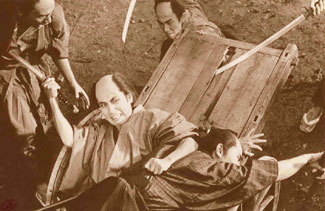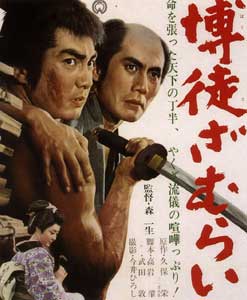Gambling Samurai (Bakuto zamurai, Daiei, 1964) is a somewhat misnomered title, or an ironic one since the peasant hero moves chameleon-like through the class system, at one point becoming a merchant, & later seeking samurai status.
Raizo Ichikawa plays Sennosuke Yuten, an orphaned peasant who grew to manhood in a feudal age, a good swordfighter despite lacking formal grace & training, & who became a wanderer.
 Sennosuke becomes a leader of a gang of yakuza (gamblers) & strives to be a chivalrous boss, facing corrupt samurai officials to save the common people from excess taxation. But he is tricked by the corrupt official & his gang is smashed. Sennosuke becomes a leader of a gang of yakuza (gamblers) & strives to be a chivalrous boss, facing corrupt samurai officials to save the common people from excess taxation. But he is tricked by the corrupt official & his gang is smashed.
Escaping to Yokohama, he next becomes a clerk learning the life & methods of a merchant. He has decided to live a good life as a merchant, but the foreign merchants who do trade in Yokohama are corrupt & ruin the young man's resolve to give up swordplay.
Sennosuke attacks the foreigner & a corrupt official whose job it is to protect foreigners in Yokohama, but who protects only the ones who have made pay-offs or bribes. Sennosuke's raid lands him in jail.
Only samurai are ever let out of jail, & seems an ex-gambler merchant will never be set free. But Sennosuke is unexpected released, thanks to the intervention of a seemingly great man, a samurai.
Sennosuke shifts his class position again, getting work as a samurai, although born-samurai of the Shincho group never accept him because he lacks samurai manners & mannerisms. Unlucky chameleon that he has always been, the "great" samurai turns out to have been using him during the process of rising personally in power, only pretending to be fighting for the preservation of Japan against foreign interests.
The portrait of life in Yokohama during the Bakumatsu period is very interesting, with foreigners & samurai in the streets & gambling dens along with common citizens. There are several good excuses for action scenes, which begin in a rather ordinary chambara fashion, but get more intense, real, & interesting as the film progresses.
Though ostensibly a genre actioner for escapist value, director Kazuo Mori brings a few pleasant pretensions to bear, lending a degree of seriousness, addressing the impact with a society going through rapid changes as feudalism is dying. A man like Sennosuke is capable of rising from a nobody-orphaned peasant to veritable samurai, yet the samurai as a product of feudalism are becoming less & less relevant as society changes.
To a class that sees the world shifting out from under them, the incursions of a swordsman of the peasant or merchant class awakens violent class territoriality among those who think Sennosuke has risen too far.
In the course of the story he slips back to the bottom, as a yakuza ruffian & thief. But having seen every level of life in feudal Japan, he has come to learn that the future of the country is in the hands of the merchants, not the samurai.
After a spectacular final duel in which he ultimately defeats his opponent without having to kill him, Sennosuke throws away his sword, & staggers off into the night insisting he will never die.
This ending is reminiscent of Blood End (Tengo-to, 1969) in which a peasant swordsman (Tatsuya Nakadai) betrayed by samurai companions staggers out of the hills saying he will never die. As Blood End meant to say the peasantry can never really be destroyed, Gambling Samurai means to show the indefatigable nature of the merchant class.
The film stacks the odds quite harshly in portraying chivalrous commoners like our yakuza wanderer as decent sorts, merchants as the salvation of Japan, & samurai as wholly unscrupulous & evil. This simplistic vision isn't particularly believable, but it perhaps redresses the commonly upheld sentiment in so many period films which insist on the Romance of the Samurai while underestimating or even demeaning people outside that ruling minority.
More interesting is the portrait of one man able to move up & down the social ladder, perhaps more suddenly than is plausible, but in a way that makes a good point about this period of history being so in flux.
The extraordinary black & white cinematography of Hiroshi Imai is an overwhelming plus for the film, giving it a classy classic film appearance.
As an aside, Raizo looked ill in this film, dark circles under his eyes, pale. In life Raizo was outgoing & cheerful, but he often created characters like Mist Saizo last of the ninja or Sennosuke Yuten who were pallid & deathly.
Another intriguing aside is how this film provides a very interesting exchange between Sennosuke & the mature samurai Kiyokawa, in which the seemingly heroic but self-serving samurai wins Sennosuke to his cause with intimations of comrade love (homosexuality) so common between mature & younger warriors of actual samurai culture & history. In a moment of apparent frankness & sincerity, Kiyokawa says to Sennosuke, "I love you. I love your character & your swordsmanship. Will you give me your life?"
Sennosuke is at first taken aback, but already owes Kiyokawa his life, & finally gives an adamant: "Yosh! My life is yours!" then adds blushingly, "I love you too."
Kiyokawa is satisfied & ends the conversation with the somewhat whimsical, "Then we're lovers." Subliminal homosexuality is common in yakuza & samurai films, but this exchange rather less subliminal than usual. They do not ultimately seduce one another & their flirtation led to nothing explicit. Yet it is sweet how these two men could take the mere possibility of homosexuality for granted, & internalize it as flattery rather than threat or derogation, for homosexuality literal or not symbolized mutual commitment & loyalty to one another.
copyright © by Paghat the Ratgirl
|

 Sennosuke becomes a leader of a gang of yakuza (gamblers) & strives to be a chivalrous boss, facing corrupt samurai officials to save the common people from excess taxation. But he is tricked by the corrupt official & his gang is smashed.
Sennosuke becomes a leader of a gang of yakuza (gamblers) & strives to be a chivalrous boss, facing corrupt samurai officials to save the common people from excess taxation. But he is tricked by the corrupt official & his gang is smashed.